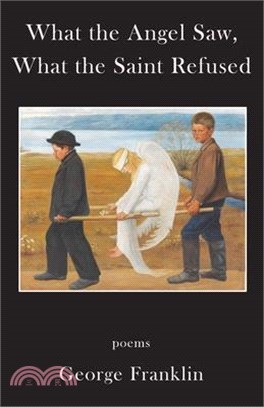What the Angel Saw, What the Saint Refused
商品資訊
ISBN13:9781962405041
出版社:NEWTYPE PUB
作者:George Franklin
出版日:2024/06/30
裝訂:平裝
規格:21.6cm*14cm*0.3cm (高/寬/厚)
商品簡介
Preface
It occurs to me that as not much narrative poetry is published these days, it might prove useful to describe how these two stories in poems came to be written. The angel first appeared in an earlier chapbook, Travels of the Angel of Sorrow. Those poems chronicled the angel's visit to a plague-ridden mountain village in winter. In What the Angel Saw, What the Saint Refused, the angel is drawn to suffering in other places and times, and as one of the poems describes, he has a habit of showing up in my living room and perusing my bookshelves. I am only partially joking. The angel poems, from the first, were written with little input from me. They were written quickly, and the editing was minimal. This was unlike any way I had ever written poetry before. I don't know who the "I" is that wrote them, but the "I" writing to you now at least knew enough not to interfere.
The poems of the saint of unbelievers were written the same way. I like the saint of unbelievers, although I'm pretty certain he wouldn't like me. I am his opposite: compromising, bourgeois, fond of companionship and creature comforts. I'm sure he would have preferred a better, more austere poet to write his story, but as my oldest son's kindergarten teacher used to tell her class: "You get what you get." As with the angel poems, I did not decide to write about the saint; the poems simply showed up.
If the angel of sorrow and the saint of unbelievers have something in common, it is that they both bear witness to suffering. Beyond that, their responses are entirely different. The angel doesn't know the purpose of his presence among humans, but grief draws him to itself repeatedly. He is helpless to improve matters, even though he sees what is happening with perfect clarity. The saint of unbelievers also refuses any subterfuge, excuse, or consolation that would diminish the harshness and injustice he witnesses. If the saint had been Job, he would have spit into the whirlwind or, better yet, laughed. He wants to shake people out of their certainties and especially rejects the transcendence of the philosophers. Unlike the angel, the saint sees a bitter humor in the tragedies that surround him, and that humor gives him an equanimity that surfaces in his conversations with the librarian. I was about to write "his friend the librarian," but I doubt the saint would admit to friendship.
Neither the angel nor the saint have any messages for anyone. They only have experience. Sometimes I wonder which of them most embodies negation: the angel who wants to understand but can't reconcile his understanding with the inevitable destruction or decay of all things, with contingency, or the saint who trains himself to reject any belief that would betray his knowledge of that same contingency and who even fears that the knowledge of death is itself a kind of belief. Regardless of such differences, they're both creatures of their own experience, and both, in very different circumstances, maintain their integrity.
主題書展
更多書展今日66折
您曾經瀏覽過的商品
購物須知
外文書商品之書封,為出版社提供之樣本。實際出貨商品,以出版社所提供之現有版本為主。部份書籍,因出版社供應狀況特殊,匯率將依實際狀況做調整。
無庫存之商品,在您完成訂單程序之後,將以空運的方式為你下單調貨。為了縮短等待的時間,建議您將外文書與其他商品分開下單,以獲得最快的取貨速度,平均調貨時間為1~2個月。
為了保護您的權益,「三民網路書店」提供會員七日商品鑑賞期(收到商品為起始日)。
若要辦理退貨,請在商品鑑賞期內寄回,且商品必須是全新狀態與完整包裝(商品、附件、發票、隨貨贈品等)否則恕不接受退貨。
























